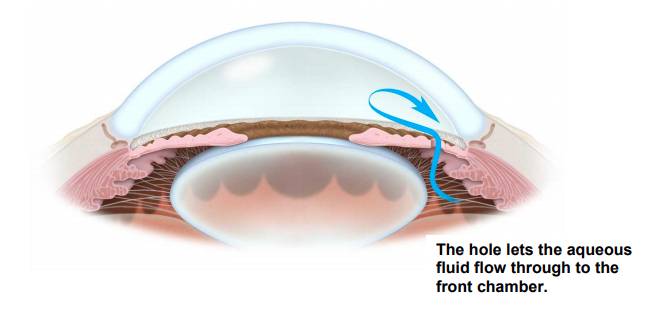Laser Iridotomies
Please note, this page is printable by selecting the normal print options on your computer.
Why is the treatment necessary?
This treatment is necessary because your ophthalmologist thinks you have, or are at risk of developing acute glaucoma. Without laser treatment you may develop an ‘attack’ of acute glaucoma. This is when your eye may become red, misty and painful over a few hours with possible sight loss. Laser Iridotomy can help to prevent this, but occasionally you may need to use eye drops as well.
What does the procedure involve?
The procedure you are having is called a Laser Iridotomy. (‘Laser’ is a type of very bright focused light). You will need to spend the whole morning/afternoon at the hospital to allow for eye
examinations before and after the treatment. You will be asked to sign a consent form before the treatment is carried out. It may be helpful for you to bring a family member/friend with you, if you need help talking to the doctor. Additionally you will need someone to drive you home, unless you have an ambulance booked.
The nurse will put in eye drops to prepare your eye for the treatment. These drops will reduce the size of your pupil, the dark circle in the coloured part of the eye (iris). These drops may give you a headache. The laser treatment itself only takes a short time (15- 20 minutes approximately).
Laser Treatment
First you sit at the laser machine, then drops are used to anaesthetise the front of your eye, and a small contact lens is placed on your eye. When the button is pressed you may feel a slight pain lasting a second or less. The laser makes a tiny hole in the iris of your eye. The hole is invisible to the naked eye. Once the hole is made fluid can flow through to the front chamber and then out of the eye. This keeps the eye pressure down. The contact lens is removed after the laser treatment. The eye will feel blurred for the next ½ hr – 1 hr. Your sight will come back gradually.

What happens afterwards?
You will be given anti-inflammatory drops to put into the treated eye. You will be instructed about how long you need to use these drops. Please continue taking your usual glaucoma drops unless you have been asked to stop them. Make sure that before leaving you have a follow up appointment. You must not expect to drive after treatment but see how you feel the following day. The hole lets the aqueous fluid flow through to the front chamber.
Are there any complications?
Laser iridotomy is a procedure that is performed often and complications are rare.
Complications can include:
• Raised pressure within the eye, which can cause headache and nausea. This is treated by eye drops and/or tablets.
• Occasionally the laser only goes half way through the iris or the hole can sometimes seal again, and you may need the hole completed later.
• Bleeding can occur inside the eye if a blood vessel is hit with the laser beam.
• Inflammation inside the eye for which you will be prescribed anti-inflammatory eyedrops.
• Cataract if the laser injures the lens of the eye.
If you have any problems such as sudden deterioration, change in vision, or severe pain in the eye, please contact the Eye Clinic.
Contact:
The Eye Clinic, Milton Keynes Hospital 01908 995539 (Please leave a message if necessary – call will be returned within 1 working day)
Monday to Friday 9.00am – 5.00pm
Out of normal working hours:
Emergency Eye Service, Stoke Mandeville Hospital, Aylesbury 01296 315000 (This is the main switchboard telephone number – please ask for Doctor on call or the eye casualty dept).
